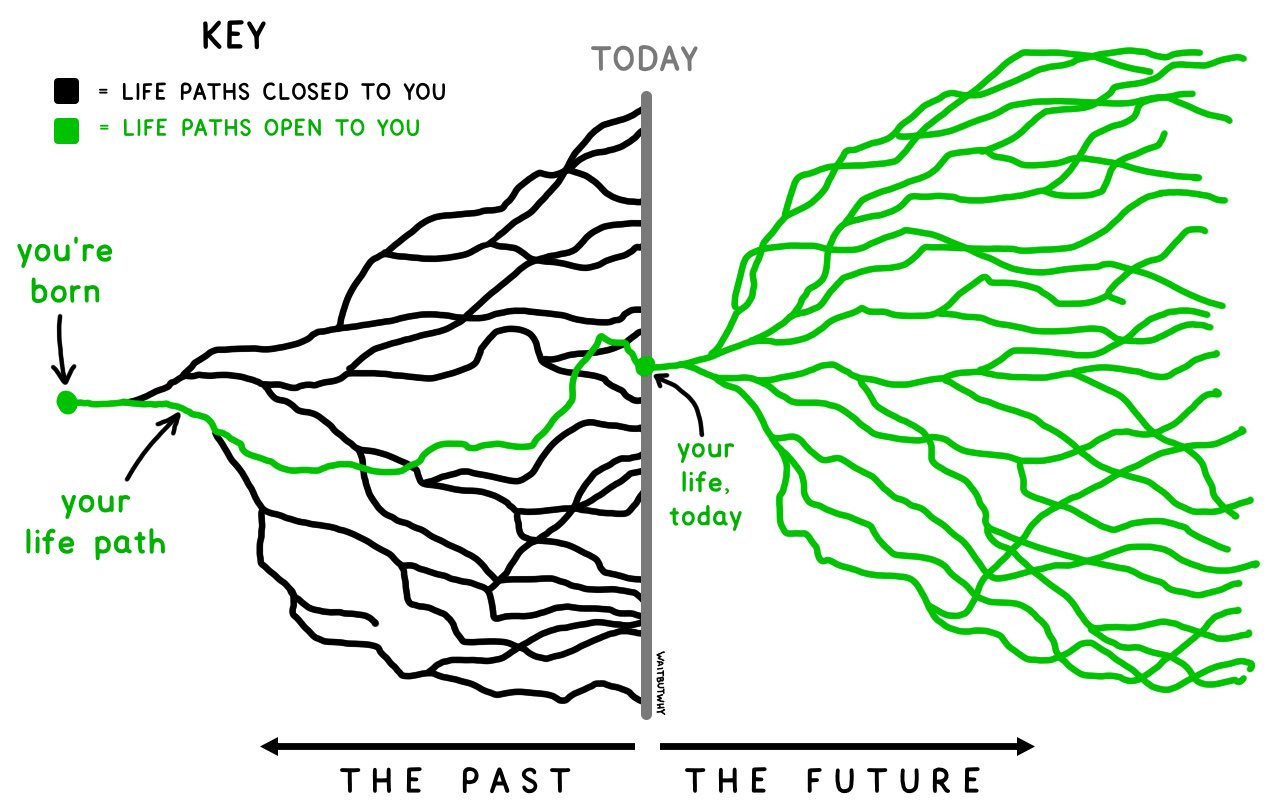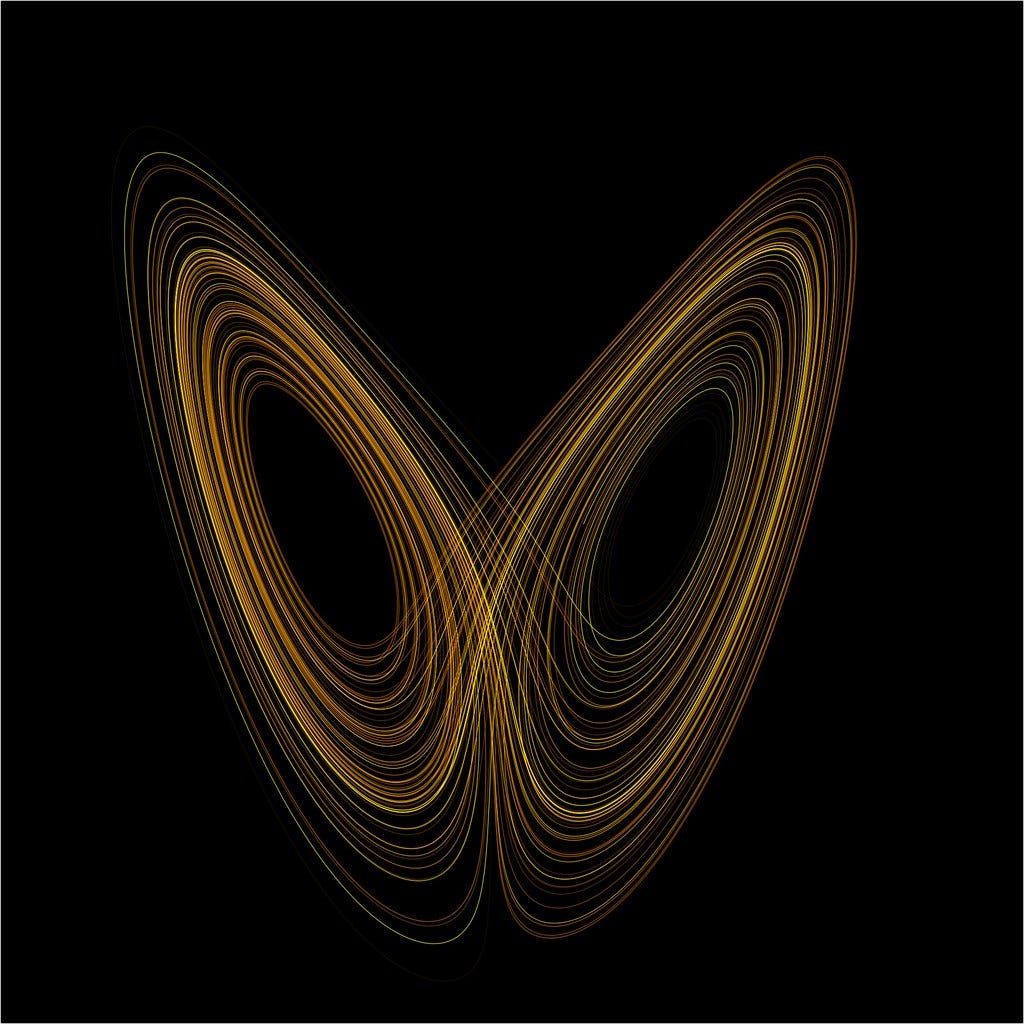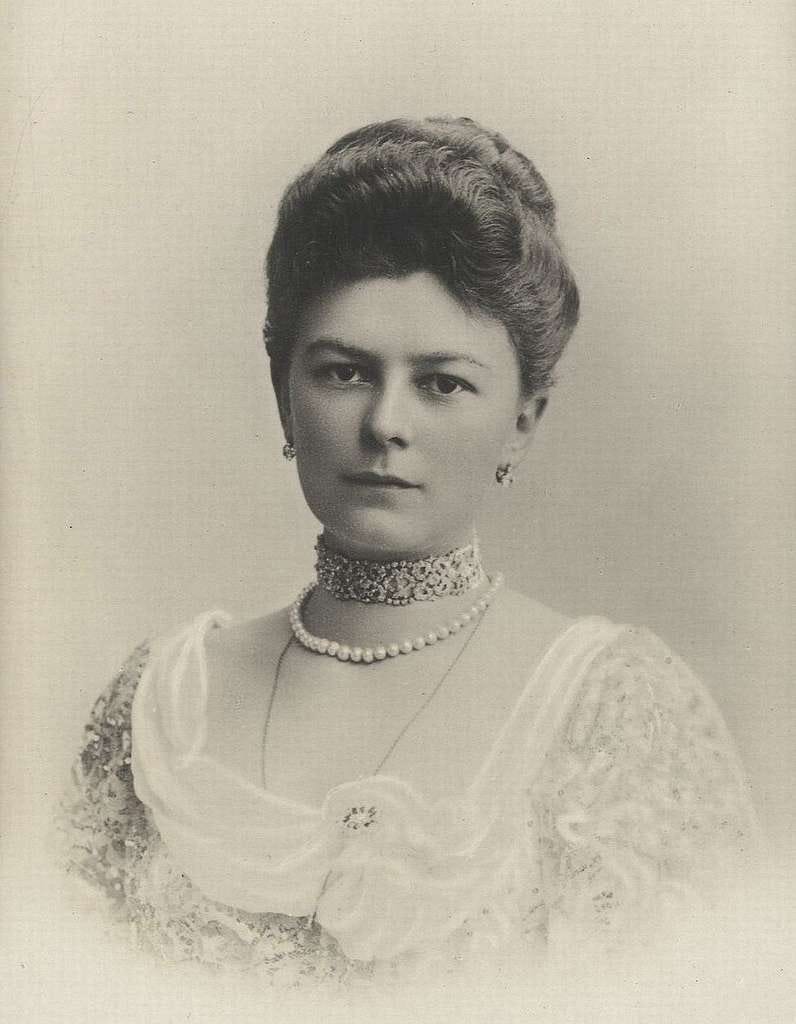I still remember waking up at 6AM, brushing my teeth, finishing my breakfast and waiting for my bus to pick me up. While I fight with my sister for the window seat.
6 hours of school, 6 days a week, for around 10 months a year. Life was predictable.
If not all, at least most events were either slightly predictable or never mattered much.
Growing up, I got aware getting anxious about losing control over life and myself, which eventually led to more anxiety. A vicious cycle.
If we keep aside you or me, and think about this randomness for a bigger set. We can understand that randomness was ever present, just lying obscure. Perhaps, we all agree to this: the 2020 COVID Pandemic was one of the the single most random event that happened to all of us (recently), approximately in the same timeline.
Why is that?
No, not the pandemic happening. But why does life start to behave randomly out of nowhere? Is there a prophecy that gets triggered as we age?
I was deeply intrigued by this question—ever so deeply that it led me to finally try to understand what’s all this nonsense happening in life—without me doing anything?
Actually, I was the one doing it.
“To straddle that fundamental duality is to be balanced: to have one foot firmly planted in order and security, and the other in chaos, possibility, growth and adventure. When life suddenly reveals itself as intense, gripping and meaningful; when time passes and you're so engrossed in what you're doing you don't notice–it is there and then that you are located precisely on the border between order and chaos.”- Jordan Peterson
The Chaos Theory
Chaos is the language of the universe—it’s that significant event which reveals itself to propel creation and evolution.
Turns out, the Chaos Theory is one of the most resonating and captivating theory that can help us understand why things falls out of place. In its simplest sense, Chaos Theory suggests that a seemingly tiny change can lead to a catastrophic transformation or an event, which couldn’t be predicted in the first place.
It sounds destructive, harming and disastrous. But it’s beautiful. Even you just see the graph that chaos theory plots in a 2D space. It outputs one of the most fascinating phenomena in maths—the butterfly effect.
Enough science, now turn to history.
I bet not many of you know who this pretty lady is.
She was the woman that the Archduke Franz Ferdinand of Austria, heir apparent to the Austro-Hungarian empire, fell in love with and then married. She was Sophie, Duchess of Hohenberg.
The Archduke was an autocrat, but he loved his wife very deeply. However, even the future monarch of the Austro-Hungarian Empire, could not have his own wife accompany him in official royal ceremonies. And he despised that.
But there was an exception to this regulation—she could accompany him in public while he acts in his military capacity as Inspector-General of the Austro-Hungarian Army. The Archduke decided to go inspect the army in Bosnia, so that his wife could accompany him in public. He rode in an open car so that everyone could see the two of them together.
And then got assassinated by a Serbian nationalist, Gavrilo Princip who suddenly jumped on the car, shot both of them at point blank range—instant kill.
Austria demanded an unconditional apology from Serbia and was determined to humiliate them. Serbia acknowledged the assassination to be awful, but had no real involvement in it. So, refused to apologize.
Austria then declared war on Serbia.
Russia (Serbia’s biggest ally at that time) declared war on Austria.
Germany (Austria’s ally at that time) declared war on Russia.
France and Great Britain (Russia’s allies at that time) declared war on Germany.
Events then spiralled out of hands and gained chaos—one of the most prominent chaos in history.
Great Britain, France and Russia on the one hand as the Triple Entente, Germany and Austria-Hungary on the other as the Central Powers.
A chain reaction presenting itself as World War I.
A simple event like a marriage of an emperor to a relative commoner triggered a catastrophic event. Now, this doesn’t mean to say that only this event caused the entire war, of course there were other factors too. However, this example illustrates how initial conditions in order can trigger disorder—which no one can predict before.
Order vs. Chaos
A tiny change can lead to a drastic transformation of something even bigger. Now, this transformation can be constructive or destructive but that’s up to the human perception. From a nature point of view, a change is when the usual order is disrupted because of a seemingly tiny change.
Eventually out of chaos, order emerges. And long stabilized order can lead to chaos.
Chaos is fluid, uncertain, sporadic, intuitive. Order is structured, compounding, scheduled, calculated.
Imagine you built a Roman Architecture style sand castle on a sunny day on a beach. And you leave it just like that for a day. Now, that’s the order—where you put different sand particles in a definitive structure.
Next day if you come back, the castle will no longer be there. Why? Because the odds are against it. There’s only a single combination of sand particles that will look exactly like your sand castle. Meanwhile, there are nearly infinite number of combinations that will nowhere look close to the original one. This is chaos or disorder.
The only way to create and sustain order is to expend energy and work against chaos to create certainty, stability and simplicity.
Okay, but how does it answer our question of why does things become random as we age?
Decision Dispersion
If you’ve lived in a modern family, or even in a tribe, chances are you didn’t have to take many decisions daily. Or, you couldn’t take decisions even if you wanted to. Because for one, you weren’t capable of it psychologically and for two, even if you were capable, the risks associated with your decision was very high and thus the family authority didn’t approve of it.
In simpler terms, when you were in the age bracket of toddler to a child, you’ve literally no power over taking decisions. You can’t eat when you get hungry, you can’t walk or run, you can’t express emotions clearly, you can’t even choose what you want to eat.
Fast forward 15 years, When you were a in the age bracket of pre-teen to teen, you had gained some power over taking your decisions. But that power came by either being rebellious or lucky. Sure, some of the power of taking decisions you did get without being rebellious—but those decisions were so trivial and routine that they hardly went off track.
So, who then, before we’re a teen, most of our major life decisions are dispersed to?
Our primary caretakers. They were the figures that actively provided efforts to make decisions for us that create an order in our lives. But not all arrows hit the target. Sometimes even a small decisions could trigger chaos in the near future. Even then the impact or chaos is deflected towards them, not us.
Life was great. Good. Because we didn’t face the chaos first hand.
Decision Accumulation—No longer a NPC
Freedom comes with a cost. YOLO comes with a cost. That cost is a face-off with chaos.
A stray encounter with a stranger working in a real-estate firm offering you his number, can significantly change the trajectory of your life—for better or worse. This person might become your business partner in the future.
A decision that took 2 mins can significantly alter the forthcoming life events. This is a very generalized example of chaos that’s can be termed constructive.
Chaos is nature’s way of propelling the life forward and applying the rule of “survival of the fittest.” Without uncertainty, we’d succumb to passiveness. Uncertainty makes us jump out of bed and actively do things to put our life in order.

Since, growing up, we never had the experience of dealing with chaos or making impactful life choices—life hardly seemed as approaching disorder. If we want a different perspective, ask caregivers how does their life seem after their offsprings have started to take care of their lives? Turns out, they might have started to feel little relaxed. Because now they no longer have to expend their energy to deal with chaos of their offspring’s life.
That unknown is now ours to own.
Freedom comes with a cost. That cost is chaos. It's the price we pay to gain exponential freedom. Something somewhere will always go wrong. We just have to ensure to balance it with more right outcomes.
After all life is all about balancing what can go wrong and what you can make right. A fine balance between order and chaos.
If you liked what you read, consider sharing it with people you like.





So you're telling me I can blame all my bad decisions on chaos right?